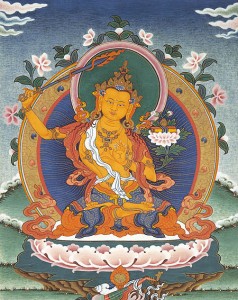An excerpt from a teaching called Compassion, Love, & Wisdom by Jetsunma Ahkon Lhamo
We are going to talk about something that is very core to the Buddha’s teaching and that you will hear about again and again as you continue to practice on the Buddha’s path. This subject is compassion. It is about love and the primordial wisdom state or true nature, and how these things relate and come together in a meaningful way. We think wisdom is a thing that can be accumulated in the same way that we accumulate clothing or jewelry or cars, and we think that the way to accomplish wisdom is to keep on learning more and more. We think wisdom is a series of facts or items that we can learn and list. But wisdom is something quite different in Buddhist philosophy.
Wisdom is less like something that you can accumulate; it is more like the realization of what is pure and natural, what underlies the phenomena that we create and the conceptual proliferation that is the mindstream we experience. Wisdom is the realization of the emptiness of self-nature and the emptiness of all phenomena. Thus the popular idea that we as Westerners have of accumulating wisdom is incorrect, according to the Buddha’s view. We tend to think we will continue in a progressive way, always increasing our knowledge, always increasing our wisdom and always increasing our ability. According to the Buddha that is not correct. In fact the opposite is actually true.
In a sense you could say that true wisdom is the less and less you know if you think of knowing as based on some concept or idea. The less ideation that one experiences the closer one is to the primordial wisdom state, the closer one is to the relaxation of one’s mind. That is wisdom. We think we will necessarily become wiser as we grow older, or that we will necessarily become more knowledgeable as we gain more education. That is not necessarily the case according to the Buddha. The things we accumulate as we grow older aren’t wisdom at all, they are ideas. They are conclusions; they are conceptualizations, such as the idea that as you grew older you learned to be more optimistic. Whatever your idea is, whether it is concrete or abstract, so long as it is conceptualization, so long as it is ideation, so long as it is experienced as a concept that one forms and seems to contain itself, it is not the traditional view of wisdom. That is considered knowledge and knowledge is something you can learn. Even on the Buddha’s path there is tremendous value in accomplishing the scholastic knowing of the Buddha’s teaching. That kind of knowledge is important and it is one of the components of wisdom, especially if that knowledge is used to accomplish the realization of the primordial wisdom state. For example, let’s say you learn all of the philosophy of the Buddha’s path and then you learn the technology, learn how to accomplish sadhana practice and how to do puja. You learn how to practice Tsalung and you go on to all of the most profound teachings that Vajrayana Buddhism has to offer. If you learn all about those different things and you are very skilled at them, and you go on to practice them, then the knowledge that you gained becomes part of the process of gaining wisdom or of realizing the natural state. You use the skills you have accumulated through gaining knowledge in order to accomplish wisdom. The difference is necessary to understand.
On the Mahayana path the accumulation of knowledge and the realization of the primordial wisdom state, or the realization of the natural state, are components that are interdependent. It is unlikely that you will simply be able to sit down knowing nothing about meditation and accomplish the realization of the primordial wisdom state. It is essential to get from the teacher what is necessary – the skills. It is necessary to get from the Buddha the milk, the nurturing of his direction and his teaching so that we can accomplish the Dharma. But true wisdom is understood not as something that one can collect, but as the realization of the natural state. That is the goal of the Buddha’s teaching.
© Jetsunma Ahkön Lhamo











